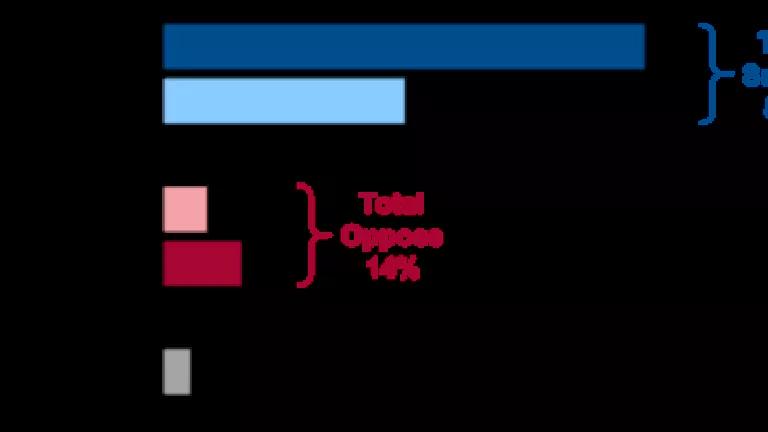
Writing a state-crafted plan to curb carbon-pollution from existing power plants is wildly popular among Virginians of all stripes. So, too, is clean energy - energy efficiency along with pollution-free sources such as solar and wind.
That's the most important take-away from a poll released late last week by a bipartisan team from Public Opinion Strategies and FM3. If you think this news sounds familiar, you're right: not only do these results affirm a resounding nationwide desire to take climate action, these results also mirror the results of another poll released last month about power plant pollution, conducted by different pollsters. That Virginia poll, too, showed efforts to cut pollution from power plants are seriously popular among Virginians.
In a new poll released last week, a full five out of six Virginians support a state plan to cut carbon pollution:
Not only do residents of Old Dominion support the CPP two to one in this new poll, but they also think the state should rely heavily on clean energy--energy efficiency, as well as pollution-free technologies such as wind and solar power--in developing a state plan to cut carbon pollution by 38 percent by 2030. In fact, a full 83 percent of those surveyed--5 out of 6 Virginians--think this is an excellent idea. And, unlike many topics in Virginia, on this one, Democrats and Republicans agree, with members of both parties supporting, by 84 percent, the development of a state carbon-cutting plan. (Independents come in at 80 percent, only slightly lower.)
Most Virginians know that relying on clean energy to cut carbon pollution will create new jobs and cut energy costs:

The advantages of the Clean Power Plan are apparent to the smart people of Virginia. Almost two-thirds know that using wind and solar power in Virginia will create jobs, while only 13 percent say it will cost jobs. About half say using clean energy will cut Virginia's energy bills, compared to 27 percent who think clean energy will increase them.
But new jobs and increased energy savings are only some of the benefits of a state plan that relies on clean energy. Cutting carbon pollution from power plants in Virginia can save 1,200 lives and prevent 340 hospitalizations in the state between 2020 and 2030. That's because cutting carbon pollution from power plants also reduces the amount of dangerous sulfur dioxide, nitrogen oxides and soot that pour out of power plant smokestacks along with the carbon dioxide. Indeed, power plant pollution and climate change can impact Virginians' health and the health of their kids, of seniors and other vulnerable populations.
As a new NRDC fact sheet shows, residents' health is at sizeable risk from climate change: Hospitals and fire and rescue departments in coastal and low-lying areas of the state face significant flooding. Heat extremes are projected to rise, as is ground-level ozone--smog--that can trigger and even cause respiratory problems like asthma and emphysema. Then there are the expected increases in insect-borne infectious diseases like West Nile virus and the La Crosse virus that was discovered in Virginia for the first time in the last decade. These are all good reasons for Virginia's strong support of state action on the Clean Power Plan.
Indeed, clean energy solutions to these climate change challenges are particularly popular among Virginians: 93 percent support expanding utility programs that help consumers increase the energy efficiency of their homes. And 88 percent endorse the increasing use of solar and wind power. And no wonder, because this is the "win-win" route for Virginia to meet its Clean Power Plan goal to cut carbon pollution.
Taking the necessary steps to make these solutions a reality will reflect well on decision-makers, despite what some in Washington and Richmond seem to think. Of those polled, almost half said creating a state plan to cut carbon pollution and promote clean energy in Virginia would make them feel even more favorably toward Governor McAuliffe, for example, while a mere 5 percent would view him less favorably.
In fact, there's no downside to creating clean power solutions to climate change in Virginia. It's not a stretch or a heavy lift; the state is already 80 percent of the way toward reaching its proposed, carbon-cutting target under the CPP. And it can complete the task by implementing Gov. McAuliffe's Virginia Energy Plan. If it does, last week's bipartisan poll and a host of others show Virginia will have the support of its residents. Just like their fellow Americans, Virginians know that good things happen when we implement clean energy solutions to climate change.

